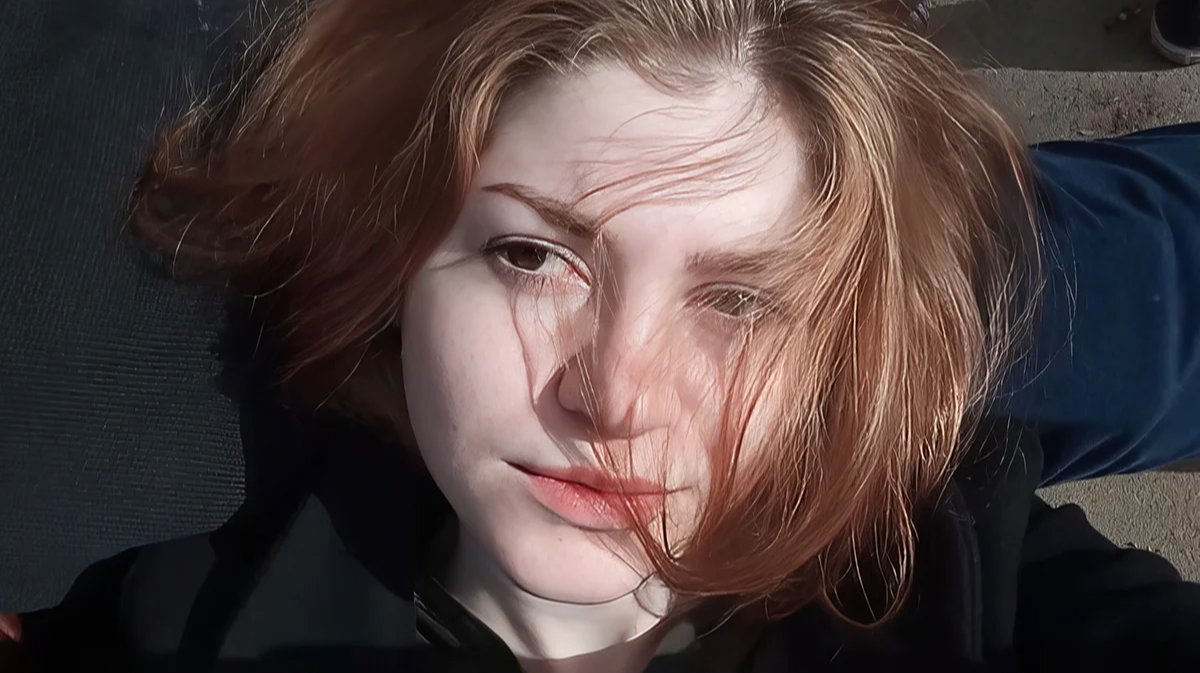Seda Suleymanova fled her home in Chechnya in 2022 fearing for her life after she refused to enter an arranged marriage. She ended up in Russia’s second city, St. Petersburg, until she was reportedly abducted by police and forcibly sent back to her family. Nothing has now been heard from her in over 150 days.
Human rights group NC SOS voiced concerns last week that she may have been murdered by her relatives. The group said it had received information of a possible “honour killing” earlier this month and that it had contacted Russia’s Investigative Committee, the federal body charged with investigating serious crimes, as well as Russia’s Prosecutor General’s Office, to look into the reports.
On 31 January, Suleymanova’s friend, Yelena Patyaeva, picketed the St. Petersburg Prosecutor’s Office, holding a banner asking, “Is Seda Suleymanova alive? Nobody has seen her for 150 days”. She spoke to Novaya Gazeta Kazakhstan about Suleymanova’s life in St. Petersburg and her abduction.
This article written by Sofia Kanevskaya first appeared in Novaya Gazeta Kazakhstan.
The escape
Suleymanova was born in the Chechen capital Grozny in 1997 and grew up in a conservative environment. She attended medical college and worked as a barista at a local coffee shop. When she turned 18, her relatives had plans for her to marry. She was suddenly forbidden from going out after work. Her relatives would search her. Her mother began to say she would tell her brother about her behaviour. After their father’s death, he was now head of the household.
“She understood that the clouds were gathering over her, and that if she didn’t escape now, she might not get another chance. … So she started looking for human rights activists who could help her escape. She got in touch with them herself and ran away.”
Suleymanova escaped Chechnya in 2022. She settled in St. Petersburg and found a job, a flat, friends and a boyfriend. In February 2023, a cousin, Akhmad Batayev, worked out where she was working. He turned up there, their conversation being caught on a surveillance camera. On that occasion, she escaped through the back door.
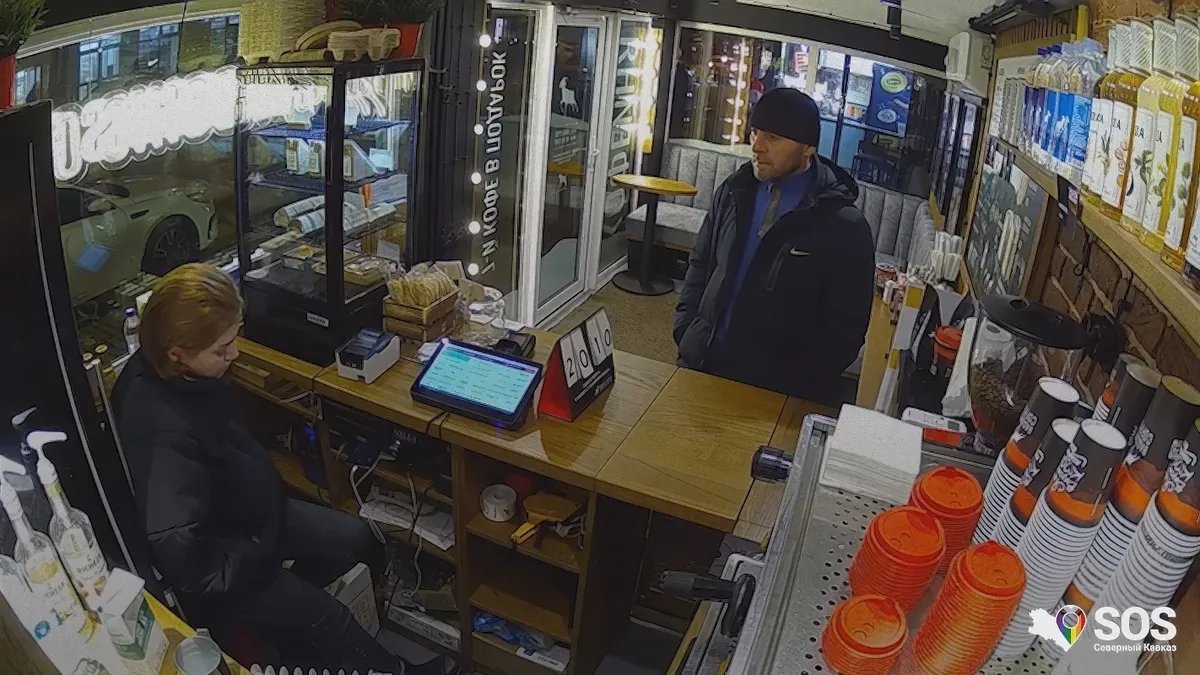
Batayev and Suleymanova in a St. Petersburg café, February 2023, photo: NC SOS / Telegram
Suleymanova promptly found a new job and moved house. On the advice of NC SOS, she spent some time at a shelter.
On 23 August, St. Petersburg police and security forces from Chechnya detained Suleymanova, alleging she had stolen jewellery belonging to her mother worth 150,000 rubles (€1,470). NC SOS said arrests on trumped up charges are now a common way to forcibly return escapees to Chechnya.
Suleymanova was taken to Grozny. She was interrogated by police without a lawyer present and forced to sign a document saying she did not require legal assistance, the group said. She left the police station and was handed over to her uncle and aunt.
Within a week, the Chechen Commissioner for Human Rights, Mansur Soltayev, published a photograph of Suleymanova on his Telegram channel, saying she faced no threat and was safe. She was wearing a long dress and a headscarf.
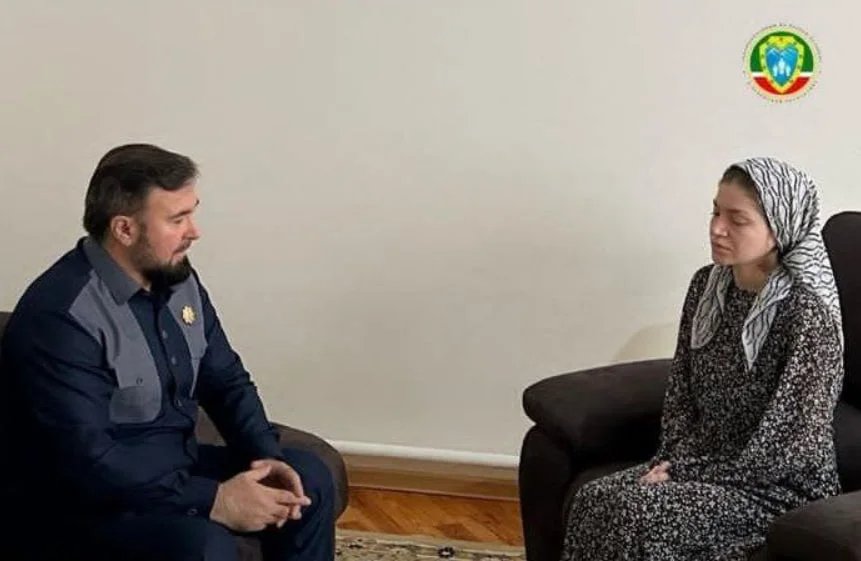
Suleymanova with the Chechen Commissioner for Human Rights, September 2023, photo: chechombudsman / Telegram
On 4 September, Soltayev uploaded a video of Suleymanova, adding that she was in good spirits and refuted any rumours about her. In mid-November, NC SOS did get photographs from her relatives but they reacted angrily at any attempt to contact her. At that point, the group felt unsure that Suleymanova was still alive, and contacted the Investigative Committee.
NC SOS suspects that Suleymanova might have been the victim of an “honour killing”. Although they occur quite frequently, the prosecution of such crimes in the North Caucasus is rare.
“We checked whether Seda is officially still alive, and she is,” the group told Sever.Realii, an affiliate of Radio Liberty that covers northwestern Russia. “There is no death certificate, but that does not mean anything in cases like this.”
One group member did manage to get through to a close relative of Suleymanova’s recently. When asked where she was, he said, “That whore? What do you mean, is she dead? She’s right here!” They then asked him to put Suleymanova on the phone or take a picture or video of her, but he refused. According to Sever.Realii, pro-government journalists also contacted the family and were given permission to speak to her, but then changed their minds.
“I still hope she may be alive, but in view of the evidence and based on experience in such cases and considering there has been no contact for five months, I think that we have reason to believe that she has been killed,” NC SOS project manager Lyusya Shtein said.
Petersburg milieu
Suleymanova and Patyaeva met through mutual friends in December 2022. They were both looking for an apartment and decided to rent a place together. Sayida, as she then introduced herself, was initially reluctant to talk about her past, but with time they became friends and she told Patyaeva the story of her escape. They only lived together for a few days before Suleymanova’s cousin found her and attempted to force her to return to Chechnya.
“She moved, just in case. But we were friends now,” Patyaeva recalls. “The last time I saw her was a week and a half before she was abducted. … We were completely relaxed. We had no idea what would happen just a few days later.”
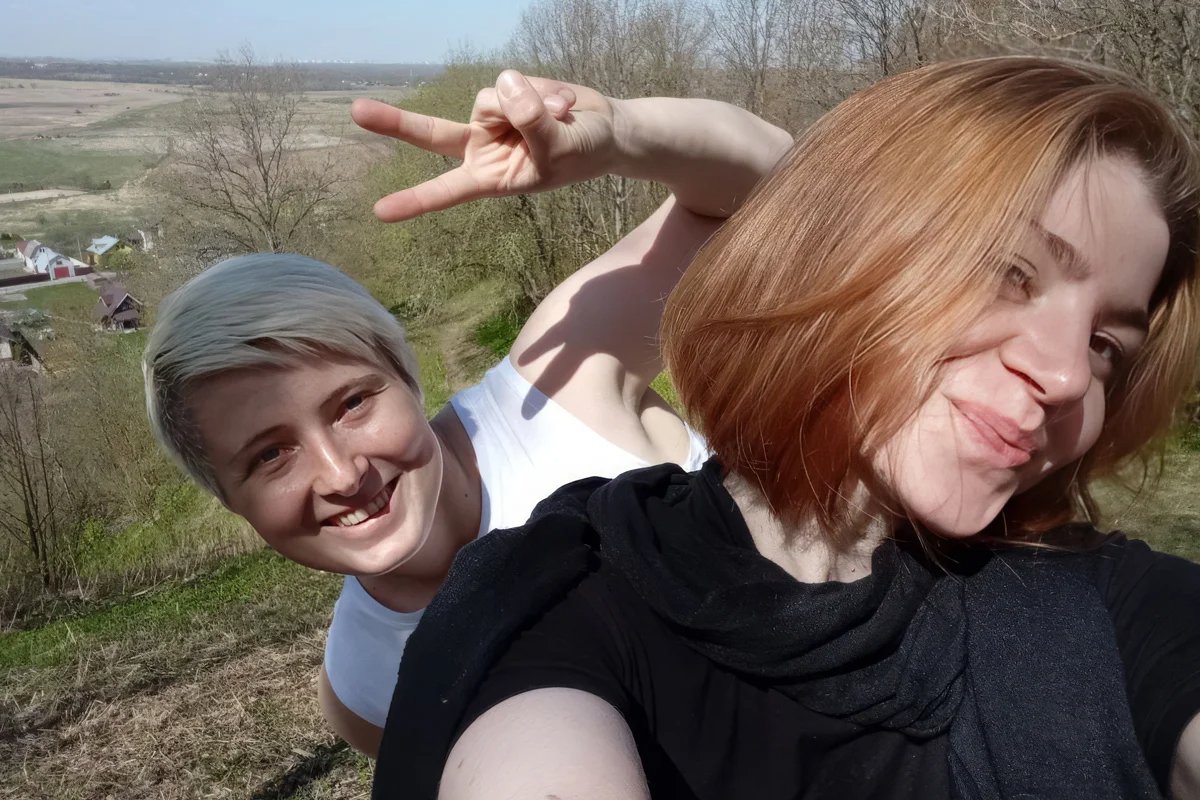
Patyaeva and Suleymanova. Photo: Yelena Patyaeva
Suleymanova was sure she would be killed if she returned to Grozny, according to Patyaeva, but she assumed her family would stop looking for her after her cousin had failed to make her return. She said that her family had a small business and was neither rich nor influential.
“She didn’t want to be on the run all her life. Just from a psychological point of view, that was hard,” says Patyaeva.
“Seda wanted to believe she had a shot at life like everyone else, an ordinary life, without having to look over her shoulder.”
“And she did believe that. But her family obviously did have connections, and Seda didn’t appreciate the extent of the danger she was in.”
Suleymanova occasionally got in touch with her mother through various messaging apps. Shortly before she was kidnapped, she told her mother that she and her boyfriend had applied for a marriage licence. Patyaeva said Suleymanova now hoped that her family would understand she could look after herself, but she now thinks her relatives took this as their cue to track her down again. They found her quickly.
Suleymanova used to say that she and her mother loved each other. She didn’t want her to be sick with worry and knew that the whole family was putting pressure on her. She also said that her brother loved her, though still believed he was capable of killing her.
Suleymanova met her boyfriend Stanislav Kudryavtsev on a popular dating app. They moved in together in April. They had both told Patyaeva it was a serious relationship, and she attributes Suleymanova’s decision not to go abroad and to end her reliance on NC SOS to the fact that she and Kudryavtsev intended to start a family.
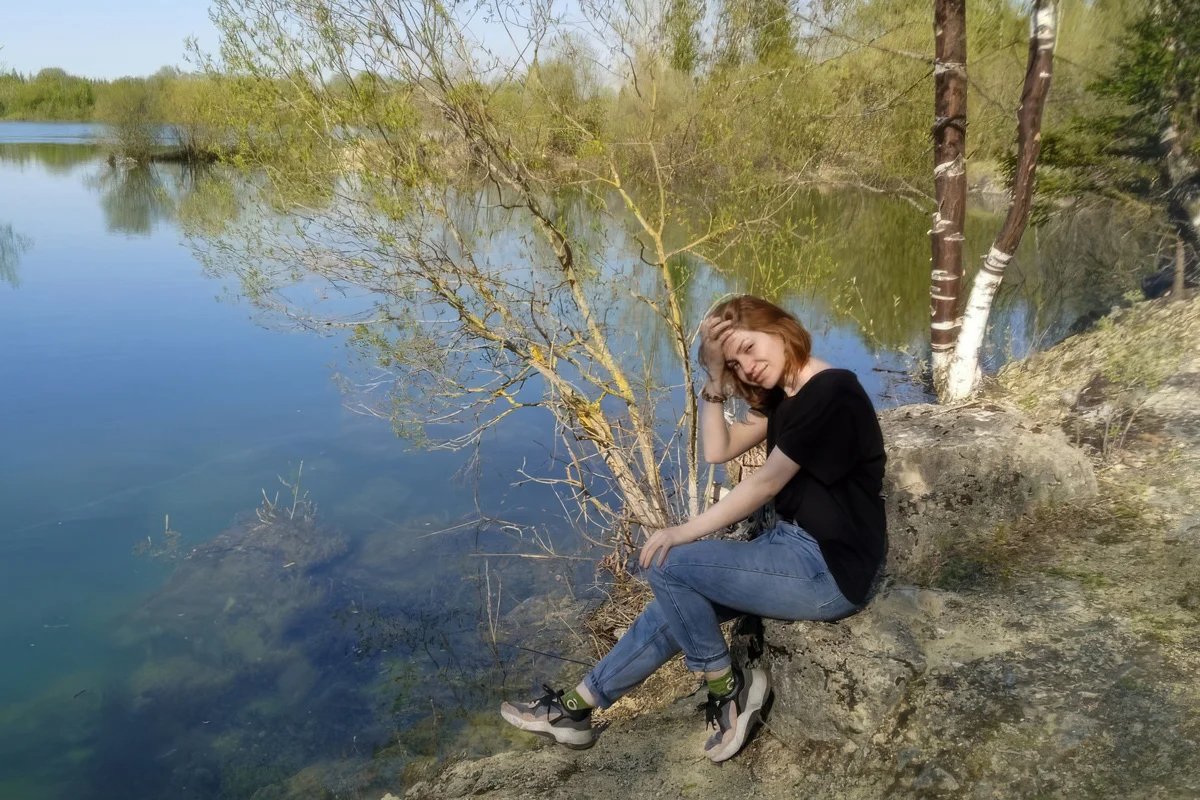
Seda Suleymanova. Photo: Yelena Patyaeva
After the abduction, Kudryavtsev converted to Islam, Shtein told Sever.Realii. NC SOS tried to negotiate with Suleymanova’s family on his behalf, thinking they might now consent to the marriage. “But nothing came of it because he’s Russian. His family even found some distant Chechen relatives, but whatever we tried, nothing worked,” she said.
In November, the Prosecutor’s Office was contacted by 900 people concerned about Suleymanova’s fate and began an investigation into her abduction. The case has now been transferred to Chechnya, and authorities there won’t provide information to anyone but Suleymanova’s next of kin, even though they are the ones suspected of her abduction and murder.
Protest for a friend
Patyaeva picketed the St. Petersburg Prosecutor’s Office on 31 January. She still remembers how scared she was. She says she had been planning to do it for a long time but didn’t know whether it was worth making a fuss. She was there for about an hour, quite a long protest by today’s standards.
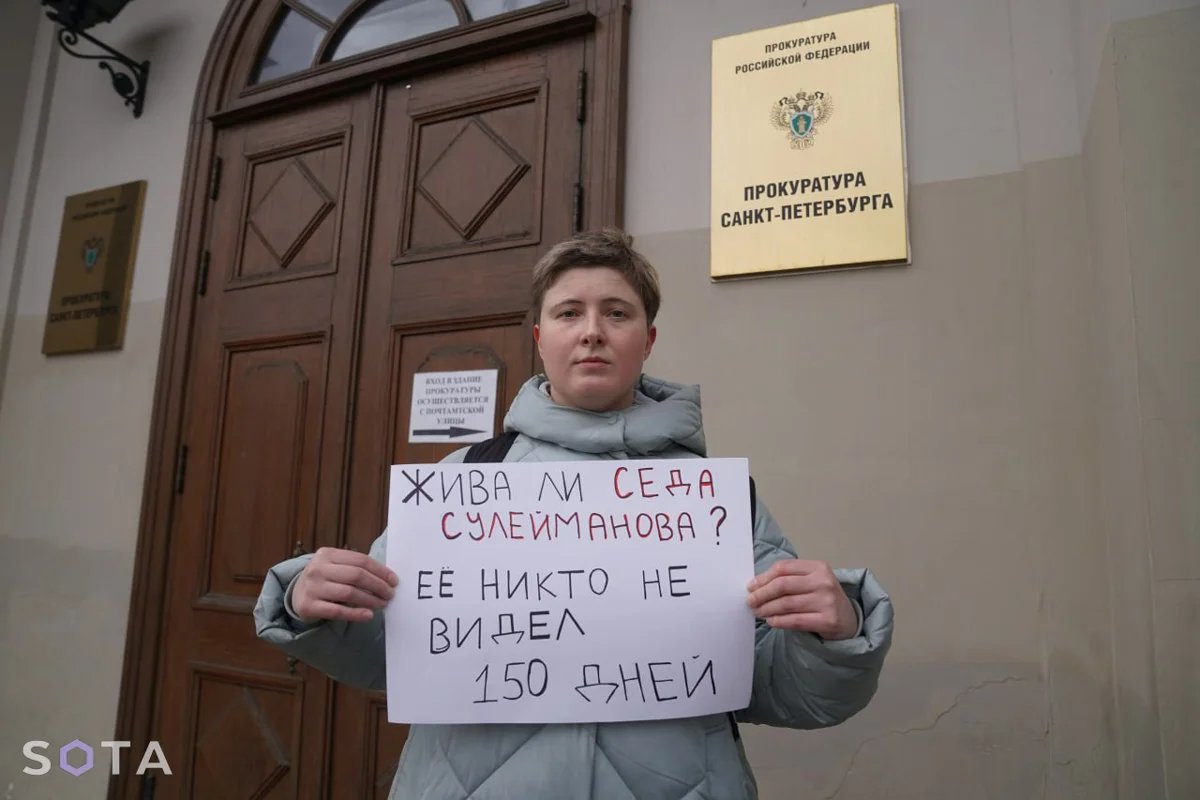
Patyaeva picketing in St. Petersburg, photo SOTA / Telegram
Policemen eventually surrounded her. “They informed me that, as a Covid safety measure, one-person protests were prohibited because they could lead to a mass gathering. In my case, there was a mass gathering of police officers.”
No passers-by stopped, but she did say many of them looked interested and photographed her from the other side of the street or from their cars.
“But the cops did all ask questions and reacted in a completely normal, humane way. I answered, they sympathised and agreed that this really needed publicity. They were surprised that there had been no contact with Seda for so long.”
She was given a ticket for violating Covid safety measures and may be fined.
She says she staged the protest when rumours of Suleymanova’s murder began to circulate. She realised she had to act.
“If there’s a chance she’s alive, I have to be able to do something, and that includes protesting and speaking to the media. I do still think there’s a chance she’s alive, despite all the rumours.”
Join us in rebuilding Novaya Gazeta Europe
The Russian government has banned independent media. We were forced to leave our country in order to keep doing our job, telling our readers about what is going on Russia, Ukraine and Europe.
We will continue fighting against warfare and dictatorship. We believe that freedom of speech is the most efficient antidote against tyranny. Support us financially to help us fight for peace and freedom.
By clicking the Support button, you agree to the processing of your personal data.
To cancel a regular donation, please write to [email protected]
